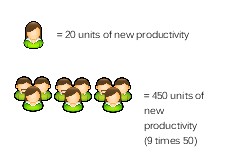Many companies have formal mentoring programs today. The best and the brightest are selected and paired with a more senior, experienced employee in order to help the junior employee grow within the organization. My feeling is that this is exactly where companies miss a huge opportunity to add to their bottom line. In focusing only on the best and the brightest, those with the most growing to do get left behind.
A mentor acts as a teacher, is available to answer the mentee’s questions about work challenges and skill development, promotes the mentee by providing exposure to new areas of the company or other senior managers, and works with the mentee on a development plan to prepare them for a possible future promotion.

Productivity Potential
The best and the brightest will generally do well whether they have a mentor or not. But what about the employees who don’t appear to have the same potential? Appearances can be deceiving, as the saying goes. Let’s say we measured employee output by in units of potential where a high performing employee is at 80 units and the rest of the team averages 50 units. By investing resources to improve the high performing employee by 20 units, a company sacrifices tapping into the 450 units of new productivity in the rest of the team. Those employees actually have the most room for growth and greater possibility of adding to the company’s overall production – especially if they feel like the company cares about their work life quality, too.
At the very least, companies should spend as much time on these employees. The gratitude they might show in return could be much more long lasting than an employee already working on their own career path.
If you’re one of the those nine employees in the picture who doesn’t have a formal mentor, find your own informal mentor – a member of the team who has a great deal of respect and a willingness to share their thoughts. Don’t wait for someone to “notice” you. Take some action to get help improving your worth in the eyes of your employer by building your own development plan. Start by reading this Guide to Informal Mentoring, a PDF file available on line. It’s not recent, but it’s accurate and still relevant.

1 comment for “Informal Mentoring”